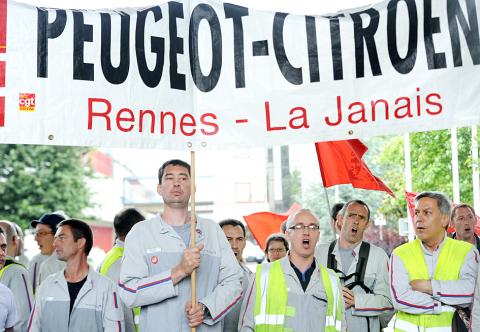PSA Peugeot Citroen’s decision to close a factory and cut an additional 8,000 jobs is unacceptable, French President Francois Hollande has said, pledging to lean on Europe’s second-biggest carmaker to renegotiate the plan.
Peugeot said on Thursday that it is to cut a total of 14,000 jobs and shut an auto plant in France for the first time in two decades to stem widening operating losses.
“The plan in the current state is not acceptable,” Hollande said on Saturday on French television.

Photo: AFP
Hollande was elected in May, promising to prevent a “parade of firings” after the election.
Peugeot’s shares plunged 7.7 percent on Friday on concern that the government may amend Peugeot’s decision to reduce costs and trim production, but there is not much wiggle room to do so, said Antonio Barroso, an analyst at the global risk research and consulting firm Eurasia Group in London.
“The range of options is limited,” Barroso said. “The Peugeot crisis is a powerful reminder of one of the most important problems facing France, which is lack of competitiveness.”
Hollande said he will consider incentives to spur sales of environmentally friendly cars and study the possibility of providing credit for vehicle purchases, though he will not adopt cash incentives like former French president Nicolas Sarkozy’s administration did to counter a recession in 2009.
With jobless claims at a 12-year high and the unemployment rate at 10 percent, Hollande said that generating jobs is his top priority. Besides Peugeot, companies including Air France-KLM Group, Carrefour and drugmaker Sanofi are mulling staff reductions in the face of stalling economic growth.
“It’s true we have a competitiveness problem,” Hollande said on Saturday. “There is an effort to be made, but it needs to be shared fairly.”
The government wants to avoid cutting salaries, but is considering shifting some social charges currently paid by employers to the social charges tax, which is paid on all forms of income including wages, pensions and capital gains.
The economic situation is already costing the Socialist president politically. Support for Hollande has dropped 7 points in the past month to 56 percent, according to an IFOP poll published on Wednesday. The survey of 1,005 voters has a margin of error of about 3 percentage points.
“Peugeot is an emblematic case that will leave its mark on people,” said Jerome Fourquet, a pollster at IFOP in Paris. “The political stakes are huge.”
Peugeot, Renault SA and Fiat SpA have posted the biggest sales declines this year in Europe, where Peugeot now expects the car market to contract 8 percent. The French carmaker has been consuming about 200 million euros (US$245 million) in cash monthly since the middle of last year.
The company will stop production at its 39-year-old factory in Aulnay, on the outskirts of Paris, in 2014. It will also lower production at a plant in Rennes to slash operational costs.

TAKING STOCK: A Taiwanese cookware firm in Vietnam urged customers to assess inventory or place orders early so shipments can reach the US while tariffs are paused Taiwanese businesses in Vietnam are exploring alternatives after the White House imposed a 46 percent import duty on Vietnamese goods, following US President Donald Trump’s announcement of “reciprocal” tariffs on the US’ trading partners. Lo Shih-liang (羅世良), chairman of Brico Industry Co (裕茂工業), a Taiwanese company that manufactures cast iron cookware and stove components in Vietnam, said that more than 40 percent of his business was tied to the US market, describing the constant US policy shifts as an emotional roller coaster. “I work during the day and stay up all night watching the news. I’ve been following US news until 3am

UNCERTAINTY: Innolux activated a stringent supply chain management mechanism, as it did during the COVID-19 pandemic, to ensure optimal inventory levels for customers Flat-panel display makers AUO Corp (友達) and Innolux Corp (群創) yesterday said that about 12 to 20 percent of their display business is at risk of potential US tariffs and that they would relocate production or shipment destinations to mitigate the levies’ effects. US tariffs would have a direct impact of US$200 million on AUO’s revenue, company chairman Paul Peng (彭雙浪) told reporters on the sidelines of the Touch Taiwan trade show in Taipei yesterday. That would make up about 12 percent of the company’s overall revenue. To cope with the tariff uncertainty, AUO plans to allocate its production to manufacturing facilities in

COLLABORATION: Given Taiwan’s key position in global supply chains, the US firm is discussing strategies with local partners and clients to deal with global uncertainties Advanced Micro Devices Inc (AMD) yesterday said it is meeting with local ecosystem partners, including Taiwan Semiconductor Manufacturing Co (TSMC, 台積電), to discuss strategies, including long-term manufacturing, to navigate uncertainties such as US tariffs, as Taiwan occupies an important position in global supply chains. AMD chief executive officer Lisa Su (蘇姿丰) told reporters that Taiwan is an important part of the chip designer’s ecosystem and she is discussing with partners and customers in Taiwan to forge strong collaborations on different areas during this critical period. AMD has just become the first artificial-intelligence (AI) server chip customer of TSMC to utilize its advanced

Six years ago, LVMH’s billionaire CEO Bernard Arnault and US President Donald Trump cut the blue ribbon on a factory in rural Texas that would make designer handbags for Louis Vuitton, one of the world’s best-known luxury brands. However, since the high-profile opening, the factory has faced a host of problems limiting production, 11 former Louis Vuitton employees said. The site has consistently ranked among the worst-performing for Louis Vuitton globally, “significantly” underperforming other facilities, said three former Louis Vuitton workers and a senior industry source, who cited internal rankings shared with staff. The plant’s problems — which have not